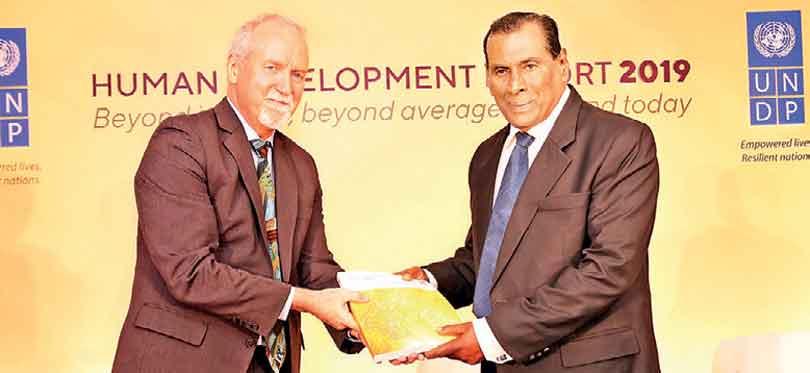12 Dec 2019 - {{hitsCtrl.values.hits}}

UNDP Sri Lanka Resident Representative Robert Juhkam handing over the report to Economic and Policy Development State Minister John Seneviratne
Sri Lanka’s Human Development Index (HDI) value for 2018 is 0.780— which puts the country in the high human development category— positioning it at 71 out of 189 countries and territories, according to the 2019 Human Development Report released by the United Nations Development Programme (UNDP).
Launched this Tuesday, at an event held at the United Nations Compound in Colombo, the report titled ‘Beyond Income, Beyond Averages, Beyond Today: Inequalities in Human Development in the 21st Century’, highlights that the Asia Pacific region has witnessed the steepest rise globally in human development.
It leads the world in access to broadband Internet and is gaining on more developed regions in life expectancy, education and access to healthcare. Yet, the next generation of inequalities are emerging, particularly around technology, higher education and climate resilience.
At the launch hosted by UNDP Sri Lanka, the report was ceremoniously handed over to the chief guest, Economic and Policy Development State Minister John Seneviratne, in the presence of UN Sri Lanka Resident Coordinator Hanaa Singer.
This was followed by a panel discussion moderated by UNDP Sri Lanka Resident Representative Robert Juhkam. The panellists were Central Bank of Sri Lanka Economic Research Director Dr. Chandranath Amarasekera, Prof. Dileni Gunawardena from the University of Peradeniya, Aitken Spence PLC Plantations and Business Development Head Dr. Rohan Fernando and Centre for Poverty Analysis Senior Research Professional Kulasabanathan Romeshun.
The report analyses inequality in three steps: beyond income, beyond averages and beyond today, proposing a battery of policy options to tackle it. It goes beyond the dominant discourse focusing on income disparities to also considering inequalities in other dimensions such as health, education, access to technologies and exposure to economic and climate-related shocks.
It uses new data and methods that will highlight, in a way that measures based on averages cannot, how inequality affects people’s lives and it will take a long-term view towards 2030 and the achievement of the Sustainable Development Goals and beyond.
According to the report’s HDI, no other region has experienced such rapid human development progress. South Asia was the fastest growing region (46 percent growth over the period 1990-2018), followed by East Asia and the Pacific at 43 percent. Of all countries on the HDI, Thailand had the second-highest increase after Ireland, moving up 12 ranks during 2013-2018. Indonesia and the Philippines both joined the ranks of countries with high human development. South Asia also saw the greatest leap in life expectancy and years of schooling.
Looking beyond today, the report asks how inequality may change in the future, particularly through the lens of climate change and technological transformation – two forces that seem set to shape human development outcomes into the next century.
24 Dec 2024 12 minute ago
24 Dec 2024 15 minute ago
24 Dec 2024 29 minute ago
23 Dec 2024 23 Dec 2024